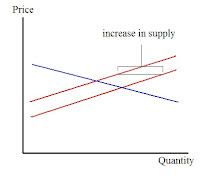Thomas Bayes was born in 1702. In 1763, two years after his death, his famous theorem surfaced at the Royal Society of London. Here is one formulation:
prior odds × likelihood ratio = posterior odds
This modest equation has earned Bayes immortality in the rationalist pantheon. In short, it shows that, when evaluating a hypothesis, there's more to consider than just the evidence. Prior expectations also count.
As an example, let's suppose a man visits his doctor, suspecting he has a certain rare disease. Our hypothesis is that he has the disease. According to studies, only 1 in 10,001 people have it. The prior odds are therefore 1:10,000, which goes into our equation as 1/10,000.
The doctor then takes a blood sample and runs a test. The test is 99% accurate. It comes back positive, making the likelihood ratio 99. (Specifically, the likelihood ratio is the probability that the disease will cause the result — 99% — divided by the probability that a healthy person will cause the result — 1%.)
At this point, the man panics. But Thomas Bayes knew better. If we do the math to find out the odds that the man has the disease, taking all the data into account — multiplying to find the the posterior odds — we get 99:10,000, or slightly less than a 1 in 100 chance that he has the disease:
1/10,000 × 99 = 99/10,000
Basically, because the disease is so rare, he's 99 times more likely to be a healthy person with a false positive than someone with the disease.
On to the point. When thinking about 9/11 conspiracies, Bayes matters. This time let the hypothesis be that George Bush orchestrated 9/11. What's the likelihood (ignoring the evidence collected after the fall of the twin towers) that president Bush could have coordinated all of this? Given the complexity of the operation, it would have been very difficult. There must have been dozens, if not hundreds, of top officials involved in this, all of whom had a good chance of being treated like heroes if they prevented it. How did he keep them from talking? How did he keep other people from noticing? The idea strains credulity. What about the angry Muslims hypothesis? After 50 years of malevolent U.S. intervention in the Middle East, it sounds pretty plausible. Even more so after the U.S.S. Cole incident and other terrorist acts. Due to the extreme imbalance between the two options, I give the prior odds a value of 1/500.
What about the evidence collected after the disaster? It's plausible that it could have been caused by explosives. It's also plausible (to me) that 9/11 conspiracy theorists are not very good at forensics, and simply read too much into the evidence. So I give the likelihood ratio a value of 1/1, or just 1.
Wow, that's unsettling! A 50/50 chance that the evidence was caused by explosives! Well, no, not really. If you do the math — 1/500 × 1 = 1/500 — you find that it's still extremely unlikely that George Bush caused 9/11.
Many 9/11 Truthers, like the panicked patient earlier, are looking at their data out of context, ignoring the extreme unlikelihood of their hypothesis in the first place.
Just for fun, let's take this a little further. Even given assumptions that are far too kind, it's still unlikely: 1/50 × 10 = 1/5.
In fact, given my value of 1/500 for the prior odds, if I wanted merely 50/50 posterior odds that George Bush was responsible, the evidence collected after 9/11 would have to suggest a likelihood ratio of 500 to 1 that explosives, not planes, destroyed the buildings. In order to get this number, we would basically have to find the detonator intact with George Bush's fingerprints on them. And then get confessions from a dozen senior officials. And then find written instructions for the destruction of the twin towers in a drawer of the desk in the Oval Office. It's silly.
And that's why I don't bother with this issue.

No comments:
Post a Comment